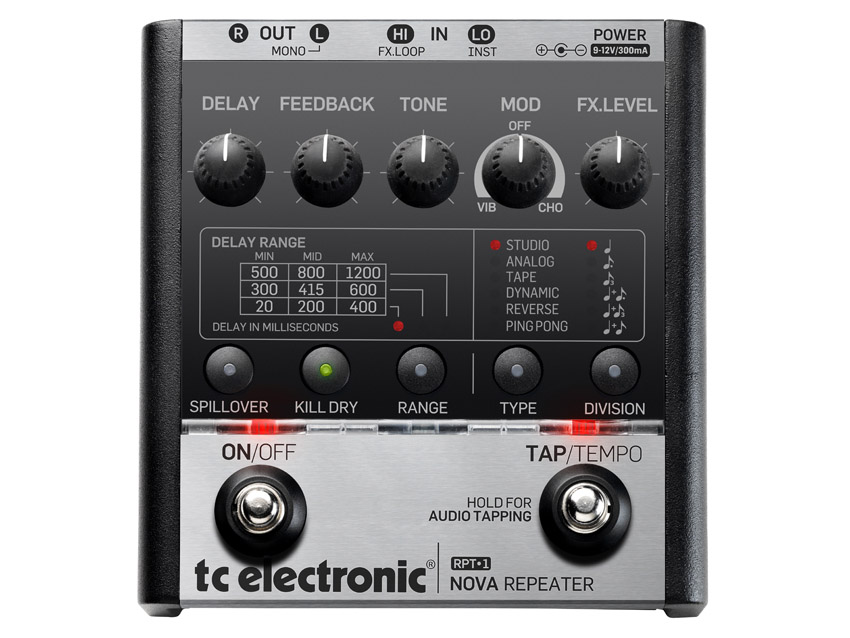MusicRadar Verdict
A comprehensive yet practical source of delay for the gigging guitarist.
Pros
- +
Features optimised for guitarists. Dual operation tap tempo. Ease of setting up sounds.
Cons
- -
12-volt operation.
MusicRadar's got your back
It's not too long ago that TC Electronic released the Nova Delay, yet here it is again with another one: the Nova Repeater. So what's going on?
Well, TC tells us it is responding to user feedback and making a no-frills delay pedal that trims out any excess baggage. That's not to say that the Nova Repeater is simply a cut-down version of the Nova Delay, as it has some extra features. However, while the Nova Delay has some facilities that guitarists might never use, the Nova Repeater's purpose is to put practical and essential delay features for guitarists into a stompbox with a streamlined and easy to use interface.
What's more it's a lot less expensive than the other Nova Series pedals. Running off a supplied 12-volt adaptor, the pedal supports mono or stereo operation and provides a choice of six different delay types. There's no setting of delay times in milliseconds here, you just set it by ear the old school way or tap the time in.
A Range button selects one of three delay ranges, and the actual delay time within the chosen range is set by a rotary knob; feedback sets the number of repeats while a tone knob tweaks the EQ. Modulation can also be added by the mod knob that's off in its centre position, but adds progressively more chorus when turned clockwise or more vibrato in an anti-clockwise direction. Naturally, the effects level is also adjustable.
The tap tempo footswitch has the added bonus of giving you up to 2290ms of delay (only 1200ms can be dialled in via the knobs) and, cleverly, holding the switch down lets you set the tempo by strumming.
There are six selectable tempo subdivisions relating to the tapped tempo so that you can enter the tempo naturally in quarter notes but get dotted eighth notes, eighth note triplets or one of three dual-delay types partnering quarter notes with dotted eighths, eighth note triples or eighths. The dual delays are separated left and right when used in stereo, but are mixed together for standard mono operation.
Sounds
The Nova Repeater might have a lot of controls, but the logical layout makes easy work of dialling-in sounds. The front panel lights let you see instantly what you're setting up and the lack of a read out in milliseconds or BPM isn't missed - you'd only need it if you play to a sequenced backing and need to sync exactly to tempo, anyway. If you prefer to use knobs rather than tapping the tempo, calling up the times you need is pretty intuitive - the ranges have been carefully chosen to match guitarist's needs with instantly accessible useful delay times in each range at the extremes of the knob.
Want all the hottest music and gear news, reviews, deals, features and more, direct to your inbox? Sign up here.
The six delay types between them provide the best of vintage and modern with the rest of the controls spicing things up - the modulation adding a hint of authenticity to the tape delay, while the tone knob helps bed things into the sound.
Easily accessed by single buttons, 'Kill Dry' mutes the dry sound and gives you just the repeats at the pedal's output (useful in a parallel effects loop and for instant weirdness using the reverse delay), while the 'Spillover' facility determines whether the repeats cut dead or die away naturally when you hit the bypass switch. These features are thoughtful and extremely practical, as is the pedal overall.
Unless you're going to go for a basic three-knob analogue stompbox and its limited range of sounds/facilities, delay pedals can often be quite complicated beasts to set up and use. TC Electronic has tackled this problem head-on with the Nova Repeater and has come up with a pedal that's extremely user-friendly while still providing a comprehensive range of sounds and features.
There's no looper, but what you do get should cover all the delay needs of most guitarists. What's not to like?
Trevor Curwen has played guitar for several decades – he's also mimed it on the UK's Top of the Pops. Much of his working life, though, has been spent behind the mixing desk, during which time he has built up a solid collection of the guitars, amps and pedals needed to cover just about any studio session. He writes pedal reviews for Guitarist and has contributed to Total Guitar, MusicRadar and Future Music among others.

